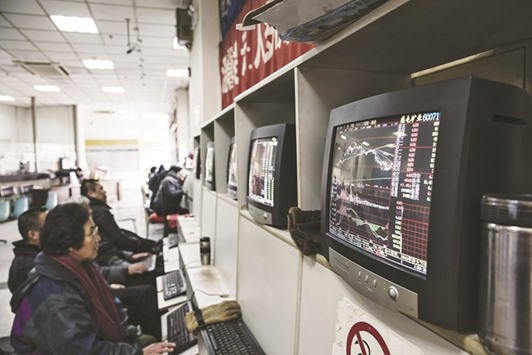Equity traders in China are rewriting the M&A rulebook.
While the conventional wisdom for mergers and acquisitions suggests that a suitor’s stock is likely to fall after its takeover plans are revealed, the opposite is happening on Chinese markets. Potential acquirers that unveiled a “major restructuring,” local code for M&A, over the past year saw their shares post an average one-month gain of 31%, according to data on the 20 largest Chinese deals compiled by Bloomberg. That compares with a 4% drop after equivalent statements in the US.
Traders in developed markets tend to sell an acquirer’s shares on concern that management will overpay, rely on overly ambitious growth targets or finance the takeover in a way that dilutes shareholders.
In China, which has a high proportion of individual investors, there’s a greater willingness to bet that deals will work out, despite a regulatory crackdown on misleading takeover information and scant evidence that acquirers reap long-term benefits.
The attitude of investors in China is that “if a company is going to do a deal, then they must be going to make money,” said Joseph Chow, who formerly led Moelis & Co’s China business and now runs CJC Partners, a financial advisory firm in Beijing. “Retail investors tend to follow what they’re led to believe.”
Most deal announcements in China follow the same pattern. A company says it’s planning a “major restructuring” (or in some cases a “major matter”) and halts its stock. Weeks later, the firm reveals more details and resumes trading, with shares rallying more often than not.
The announcements don’t all lead to plain-vanilla takeovers. Seven of the 20 biggest Chinese deals over the past year were reverse mergers, also known as backdoor listings.
These transactions typically involve a listed company issuing stock to absorb the assets of a larger firm.
For example, Maanshan Dingtai Rare Earth & New Material Co plans to issue shares to buy China’s largest private delivery service, SF Express, in a reverse merger that’s pending regulatory approval. Maanshan Dingtai’s stock posted a one-month gain of 247% after announcing deal terms in May.
There is logic to the gains in some acquirers’ shares, according to Samson Lo, head of Asian mergers and acquisitions at UBS Group in Hong Kong. Chinese companies often get better value from foreign deals than they do investing at home, gaining overseas earnings to sustain or enhance their existing valuations, Lo said.
Shares of Midea Group Co, a Chinese household-appliance manufacturer, climbed 13% in the month after the company announced a tender offer for a majority stake in German robot- maker Kuka in May. With the deal, Midea is seeking to upgrade factories and cut labour costs. Its earnings are projected to climb 20% by the end of next year.
Buying shares on M&A news comes with plenty of risks. Only seven of the top 20 Chinese deals over the past year have been completed so far. The China Securities Regulatory Commission, meanwhile, has flagged concerns over deceptive acquisition plans and related insider trading. Regulators published draft rules in June as part of an attempt to ensure companies’ statements are genuine.
Fujian Jinsen Forestry Co was fined by the CSRC last month for inflating revenue numbers in an acquisition plan disclosed in January 2015.
The deal was initially announced in 2014 and spurred a 72% surge in the company’s shares over six trading days. In February last year, the firm scrapped its “major restructuring” plan, citing a disagreement over an adjustment of deal terms.
The company and the executives involved “sincerely apologize to all investors” over their wrongdoing, Fujian Jinsen said in an August 19 filing. Two calls to the office of the firm’s board secretary went unanswered.
Even companies in default have seen their shares rise after “major restructuring” notices. Sainty Marine Corp, a shipbuilder based in the eastern Chinese city of Nanjing, had more than 800mn yuan ($120mn) of loans overdue when it halted its shares about a year ago. Sainty resumed trading in July, rallying 23% in four weeks after it disclosed a plan to buy assets by issuing stock to its controlling shareholder. The company remains at risk of bankruptcy, Sainty said in several August filings, and the transactions need government approval.
Like anywhere else in the world, bets on Chinese takeovers face regulatory risk. While Tianjin Tianhai Investment Co surged 61% in five days following statements in July that it planned to acquire California-based Ingram Micro, the transaction has been held up as US officials review the deal’s implications on national security.
Shares of the Chinese firm, an affiliate of conglomerate HNA Group Co, have dropped 10% from their August high. The Shanghai Composite Index added 0.1% yesterday.
“Retail investors rushed into stocks for their deal stories, many of which haven’t materialised,” said Dai Ming, a fund manager at Hengsheng Asset Management Co in Shanghai. Share gains after takeover announcements will probably moderate as the regulator tightens oversight, Dai said.

People sit at trading terminals at a securities exchange house in Shanghai. The Shanghai Composite Index added 0.1% yesterday.
